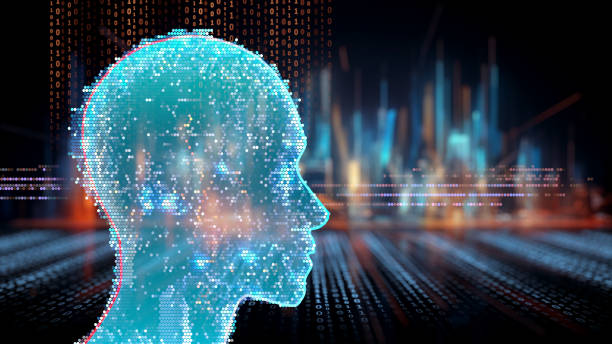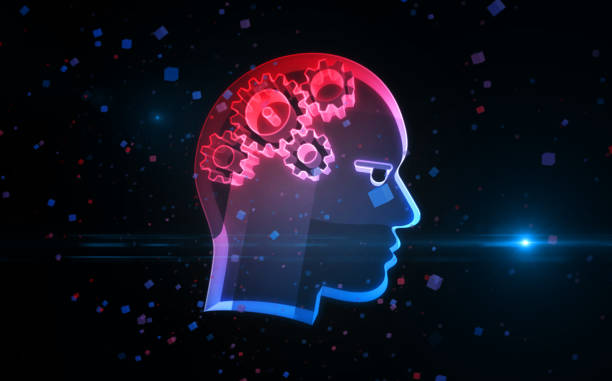What is Artificial Intelligence and What are its Applications?

#Artificial_Intelligence (Artificial Intelligence or AI) is, in short, a branch of computer science that deals with building machines that are capable of performing tasks that usually require human intelligence.
These tasks can include learning, reasoning, problem-solving, understanding natural language, pattern recognition, and decision-making.
In other words, the goal of artificial intelligence is to create systems that can act independently and intelligently.
Artificial intelligence is currently used in various fields, including:
– **Medicine**: Disease diagnosis, drug development, robotic surgery
– **Finance**: Fraud detection, risk management, investment consulting
– **Transportation**: Self-driving cars, traffic management
– **Manufacturing**: Industrial automation, quality control
– **Customer service**: Chatbots, automated answering of questions
– **Education**: Intelligent educational systems, personalized content delivery
These are just a few examples of the many applications of artificial intelligence, and with the advancement of this technology, we expect to see its wider use in our daily lives in the future.
The use of artificial intelligence in many industries has led to increased productivity, reduced costs, and improved service quality.
Are you dissatisfied with the low sales of your online store?
Rasaweb is your solution for having a professional and high-selling online store.
✅ Significant increase in sales and revenue
✅ Easy and enjoyable shopping experience for customers
⚡ Get free consultation from Rasaweb right now!
Types of Artificial Intelligence: Approaches and Classifications

Artificial intelligence can be categorized based on various criteria.
One of the most common classifications is based on the capabilities of artificial intelligence:
– **Narrow AI**: This type of artificial intelligence is only capable of performing a specific task and performs very well in that task.
Examples include facial recognition systems, search engines, and voice assistants.
– **General AI**: This type of artificial intelligence is capable of doing anything that a human can do.
No general AI system exists yet, but this is the ultimate goal of many AI researchers.
– **Super AI**: This type of artificial intelligence surpasses human intelligence and is capable of doing things that humans cannot even imagine.
This is a theoretical concept and there is no example of it yet.
Artificial intelligence can also be categorized based on the different approaches used to develop it, including:
– **Machine Learning**: In this approach, artificial intelligence systems learn from data and acquire the ability to perform tasks without explicit programming.
– **Deep Learning**: This is a subset of machine learning that uses deep artificial neural networks to learn from data.
– **Fuzzy Logic**: This approach allows artificial intelligence systems to deal with uncertainty and ambiguity.
Choosing the right approach for developing artificial intelligence depends on the type of problem and the available data.
Machine Learning: The Backbone of Artificial Intelligence

Machine Learning is one of the most important sub-branches of artificial intelligence and plays a very important role in the development of intelligent systems.
In machine learning, instead of giving the system explicit instructions to perform a task, it is given data, and the system learns how to recognize patterns in the data and use them to make predictions or decisions.
There are different types of machine learning algorithms, including:
– **Supervised Learning**: In this type of learning, the system is trained using labeled data (i.e., data for which the correct answer is known).
– **Unsupervised Learning**: In this type of learning, the system is trained using unlabeled data and must automatically find patterns in the data.
– **Reinforcement Learning**: In this type of learning, the system learns how to achieve the best result in a specific environment by trial and error.
Machine learning is used in various fields, including:
– **Image recognition**: Face recognition, object recognition in images
– **Natural language processing**: Machine translation, text summarization, question answering
– **Prediction**: Sales forecasting, weather forecasting
– **Recommendation**: Product recommendations, movie recommendations
Table 1. Types of Machine Learning Algorithms
| Algorithm Type | Description | Example |
|---|---|---|
| Linear Regression | Predicting a continuous value based on a linear relationship between variables | Predicting house prices based on area |
| Logistic Regression | Predicting a discrete (binary) value based on probability | Detecting spam emails |
| Support Vector Machine | Classifying data by finding the best separating line | Identifying types of flowers based on features |
How Does Natural Language Processing Make Machines Understand?

Natural Language Processing (NLP) is a branch of artificial intelligence that allows machines to understand and process human language.
NLP includes a wide range of tasks, including:
– **Speech Recognition**: Converting speech to text
– **Machine Translation**: Translating text from one language to another
– **Text Summarization**: Producing short summaries of long texts
– **Sentiment Analysis**: Detecting emotions in a text
– **Question Answering**: Answering questions asked in natural language
To perform these tasks, NLP systems use various techniques, including:
– **Language Modeling**: Creating models that estimate the probabilities of words and phrases occurring in a language.
– **Deep Learning**: Using deep neural networks to learn patterns in language.
– **Linguistic Rules**: Using linguistic rules to analyze the structure of sentences.
NLP is used in various fields, including:
– **Chatbots**: Creating conversational bots that can answer user questions.
– **Information Retrieval**: Improving the accuracy and efficiency of search engines.
– **Social Media Analysis**: Analyzing user opinions and sentiments in social media.
With the advancement of NLP, it is expected that human-machine interaction will become increasingly natural and easy.
Do you dream of a thriving online store but don’t know where to start?
Rasaweb is your comprehensive solution for online store website design.
✅ Attractive and user-friendly design
✅ Increase sales and revenue⚡ Get free consultation
How Does Computer Vision Allow Machines to See?

Computer Vision is a branch of artificial intelligence that allows machines to understand and process images and videos.
The goal of computer vision is to create systems that, like humans, can extract useful information from images and videos.
Computer vision includes a wide range of tasks, including:
– **Object Detection**: Identifying and locating objects in images and videos.
– **Face Recognition**: Identifying and recognizing people’s faces in images and videos.
– **Image Segmentation**: Dividing images into different regions based on visual features.
– **3D Reconstruction**: Reconstructing 3D models of objects and scenes from images.
– **Object Tracking**: Tracking the movement of objects in videos.
To perform these tasks, computer vision systems use various techniques, including:
– **Deep Learning**: Using deep neural networks to learn patterns in images.
– **Image Processing**: Using image processing algorithms to improve the quality of images and extract features.
– **Computational Geometry**: Using computational geometry techniques for 3D reconstruction.
Computer vision is used in various fields, including:
– **Self-driving cars**: Detecting obstacles and traffic signs.
– **Medical diagnostics**: Diagnosing diseases from medical images.
– **Video surveillance**: Detecting suspicious activities in surveillance videos.
– **Augmented Reality**: Integrating virtual images with the real world.
Applications of Artificial Intelligence in Medicine

Artificial intelligence is rapidly transforming the medical industry and has great potential to improve the diagnosis, treatment, and prevention of diseases.
Some applications of artificial intelligence in medicine include:
– **Disease Diagnosis**: Artificial intelligence systems can analyze medical images such as X-rays, MRIs, and CT scans and diagnose diseases more accurately than humans.
This can help with early diagnosis of diseases and improve treatment outcomes.
– **Drug Development**: Artificial intelligence can be used to identify new drug targets, design drug molecules, and predict drug effectiveness.
This can accelerate the drug development process and reduce its costs.
– **Robotic Surgery**: Surgical robots equipped with artificial intelligence can perform complex surgeries with greater precision and skill than human surgeons.
This can lead to fewer complications and improved surgical outcomes.
– **Healthcare Management**: Artificial intelligence can be used to manage patient information, schedule appointments, predict patient needs, and provide personalized care.
This can lead to improved efficiency and quality of healthcare.
Overall, artificial intelligence has great potential to improve human health and well-being and is expected to play an increasingly important role in the medical industry in the future.
The Future of Artificial Intelligence: Opportunities and Challenges

The future of artificial intelligence looks very bright and promising.
With the advancement of technology, artificial intelligence is expected to penetrate more areas of our lives and help solve many complex problems.
However, the development of artificial intelligence is also associated with challenges that need to be addressed.
Opportunities
– **Improving Productivity and Efficiency**: Artificial intelligence can help automate repetitive and tedious tasks, allowing humans to focus on more creative and strategic work.
– **Creating New Jobs**: The development and maintenance of artificial intelligence systems requires skilled professionals and can lead to the creation of new jobs.
– **Solving Complex Problems**: Artificial intelligence can be used to solve problems such as climate change, poverty, and disease.
Challenges
– **Ethical Concerns**: The use of artificial intelligence in important decision-making can lead to ethical concerns, especially if artificial intelligence systems are discriminatory or violate human rights.
– **Job Loss**: Automation caused by artificial intelligence can lead to job loss in some industries.
– **Security**: Artificial intelligence systems can be the target of cyber attacks and be misused.
Table 2. Advantages and Disadvantages of Using Artificial Intelligence
| Advantages | Disadvantages |
|---|---|
| Increased accuracy and speed in performing tasks | High implementation and maintenance costs |
| Reducing human error | Security and privacy concerns |
| Improved decision-making by analyzing big data | Potential for job loss |
| Usable in dangerous and difficult conditions | Need for technical expertise for development and management |
The Impact of Artificial Intelligence on Businesses

Artificial intelligence has a profound impact on businesses around the world.
This technology helps companies increase their efficiency, make better decisions, offer new products and services, and improve customer experience.
Some applications of artificial intelligence in businesses include:
– **Process Automation**: Artificial intelligence can automate repetitive and time-consuming processes, such as data entry, invoice processing, and answering customer questions.
– **Data Analysis**: Artificial intelligence can analyze big data and identify patterns and trends that humans are unable to see.
This can help companies make better decisions about pricing, marketing, and product development.
– **Prediction**: Artificial intelligence can be used to predict sales, demand, and other business trends.
This can help companies optimize their inventory, allocate their resources more effectively, and reduce their risks.
– **Customer Experience**: Artificial intelligence can be used to provide personalized customer service, quickly answer questions, and solve problems.
This can lead to increased customer satisfaction and brand loyalty.
Businesses that use artificial intelligence can gain a significant competitive advantage over their competitors.
However, implementing artificial intelligence can be challenging and requires significant expertise and investment.
Does your current website display your brand’s credibility as it should? Or does it scare away potential customers?
Rasaweb, with years of experience in designing professional corporate websites, is your comprehensive solution.
✅ A modern, beautiful website that matches your brand identity
✅ Significant increase in lead generation and new customers
⚡ Contact Rasaweb now to receive a free corporate website design consultation!
How Can Artificial Intelligence Improve Daily Life?

Artificial intelligence is increasingly present in our daily lives and can improve our lives in various ways.
Some applications of artificial intelligence in daily life include:
– **Voice Assistants**: Voice assistants such as Siri, Alexa, and Google Assistant can help us do things like set reminders, play music, send messages, and answer questions.
– **Recommenders**: Artificial intelligence-based recommenders can suggest movies, music, books, and other products that we are interested in.
– **Machine Translation**: Machine translation can help us communicate with people who speak other languages.
– **Security**: Artificial intelligence-based security systems can protect homes and businesses from theft and other crimes.
– **Health**: Artificial intelligence-based health apps can help us track our health, receive personalized health advice, and manage chronic diseases.
With the advancement of technology, artificial intelligence is expected to play an increasingly important role in our daily lives, helping us with everyday tasks, improving our health and well-being, and connecting with others.
Skills Needed to Enter the World of Artificial Intelligence

Entering the world of artificial intelligence requires having various skills.
Some of the most important skills required are:
– **Programming**: Knowledge of programming, especially Python and R languages, is essential for developing and implementing artificial intelligence systems.
– **Mathematics**: Knowledge of mathematics, especially statistics, linear algebra, and calculus, is essential for understanding and using machine learning algorithms.
– **Machine Learning**: Knowledge of machine learning algorithms, data processing techniques, and model evaluation methods is essential.
– **Natural Language Processing**: Knowledge of natural language processing is essential for developing systems that can understand and process human language.
– **Computer Vision**: Knowledge of computer vision is essential for developing systems that can understand and process images and videos.
– **Problem-Solving Skills**: Problem-solving skills are essential for identifying and solving complex problems in the field of artificial intelligence.
– **Communication Skills**: Communication skills are essential for communicating with other professionals, presenting results, and writing reports.
In addition to these skills, having a curious mind, a passion for learning, and the ability to work in a team are also important for success in the world of artificial intelligence.
FAQ
| Question | Answer |
|---|---|
| What is Artificial Intelligence? | It is the simulation of human intelligence in machines that are programmed to think like humans and imitate their actions. |
| What are the main branches of Artificial Intelligence? | They include machine learning, deep learning, natural language processing, computer vision, and robotics. |
| What is Machine Learning? | It is a branch of artificial intelligence that focuses on enabling systems to learn from data and identify patterns without explicit programming. |
| Give examples of AI applications in our daily lives. | Voice assistants (such as Siri and Alexa), recommendation systems in Netflix and Amazon, self-driving cars, and facial recognition software. |
| What is Deep Learning? | It is a subset of machine learning that uses multi-layered (deep) artificial neural networks to process large amounts of data. |
| What is Natural Language Processing (NLP)? | It is a branch of artificial intelligence that focuses on enabling computers to understand, interpret, and generate human language. |
| What are some of the ethical concerns related to AI? | They include bias in data, privacy, job losses, and accountability in case of errors. |
| What are the main benefits of AI? | Increased efficiency, improved decision-making, automation of repetitive tasks, and detection of complex patterns in data. |
| How is AI used in the healthcare field? | In diagnosing diseases, discovering drugs, analyzing medical images, and providing personal care for patients. |
| How do you see the future of AI? | It is expected to continue to evolve at a rapid pace, affecting all aspects of human life, from industry to education and entertainment. |
And other services of Rasa Web Advertising Agency in the field of advertising
Smart Direct Marketing: Designed for businesses looking for digital branding through key page optimization.
Smart Google Ads: A creative platform to improve customer behavior analysis with smart data analysis.
Smart Custom Software: A creative platform to improve customer acquisition by managing Google Ads.
Smart Reportage: An effective tool for digital branding by optimizing key pages.
Smart Brand Identity: A professional solution for managing campaigns with a focus on SEO-driven content strategy.
And more than a hundred other services in the field of internet advertising, advertising consulting and organizational solutions
Internet Advertising | Advertising Strategy | Advertising Reportage
Resources
What is artificial intelligence?
,IBM Artificial Intelligence
,A brief history of artificial intelligence
,Artificial intelligence in structure
? Build the future of your business in the digital world with Rasaweb Afarin! Contact us today for professional corporate website design and launching targeted digital marketing campaigns.
📍 Tehran, Mirdamad Street, next to the Central Bank, South Kazerun Alley, Ramin Alley, No. 6



